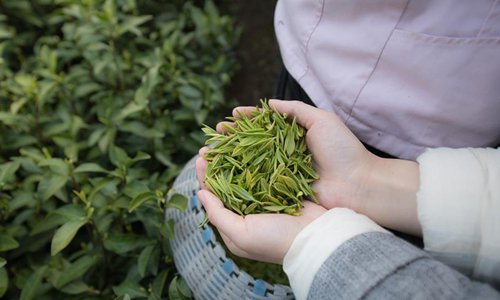
Wang Xiao checks the quality of tea buds at her tea garden in Guanyinqiao Village of Anji County, east China's Zhejiang Province, April 5, 2019. After graduating from college in 2011, Wang Xiao went back to her hometown in Anji County to manage her family's tea garden. Not only has she stopped applying chemical fertilizers to her tea garden, but also she tries to use a new way to dry tea leaves with charcoal fire, as an effort to improve the tea quality. Currently, her tea garden, about 10 mu or (about 0.67 hectare), is able to produce more than 50 kg of white tea a year. (Photo: Xinhua)
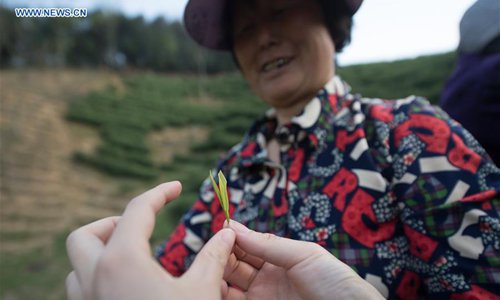
A worker listens as Wang Xiao explains the method of picking tea buds at Wang's tea garden in Guanyinqiao Village of Anji County, east China's Zhejiang Province, April 5, 2019. After graduating from college in 2011, Wang Xiao went back to her hometown in Anji County to manage her family's tea garden. Not only has she stopped applying chemical fertilizers to her tea garden, but also she tries to use a new way to dry tea leaves with charcoal fire, as an effort to improve the tea quality. Currently, her tea garden, about 10 mu or (about 0.67 hectare), is able to produce more than 50 kg of white tea a year. (Photo: Xinhua)
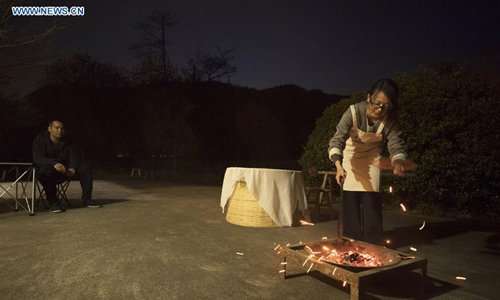
Wang Xiao (R) prepares to dry tea leaves at a workshop in Mantangli Village of Anji County, east China's Zhejiang Province, April 5, 2019. After graduating from college in 2011, Wang Xiao went back to her hometown in Anji County to manage her family's tea garden. Not only has she stopped applying chemical fertilizers to her tea garden, but also she tries to use a new way to dry tea leaves with charcoal fire, as an effort to improve the tea quality. Currently, her tea garden, about 10 mu or (about 0.67 hectare), is able to produce more than 50 kg of white tea a year. (Photo: Xinhua)
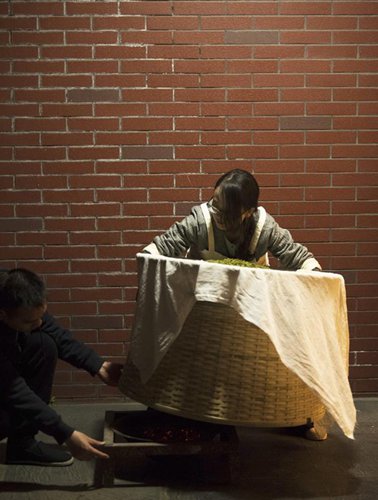
Wang Xiao (R) and her husband prepare to dry tea leaves at a workshop in Mantangli Village of Anji County, east China's Zhejiang Province, April 5, 2019. After graduating from college in 2011, Wang Xiao went back to her hometown in Anji County to manage her family's tea garden. Not only has she stopped applying chemical fertilizers to her tea garden, but also she tries to use a new way to dry tea leaves with charcoal fire, as an effort to improve the tea quality. Currently, her tea garden, about 10 mu or (about 0.67 hectare), is able to produce more than 50 kg of white tea a year. (Photo: Xinhua)
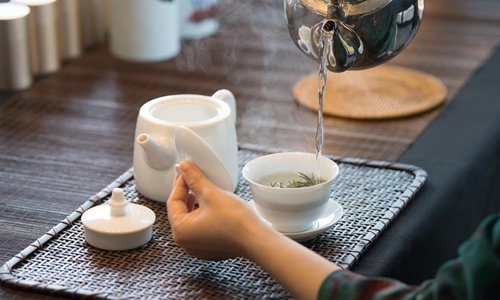
Wang Xiao makes tea for customers at a teahouse in Baishuiwan Village of Anji County, east China's Zhejiang Province, April 6, 2019. After graduating from college in 2011, Wang Xiao went back to her hometown in Anji County to manage her family's tea garden. Not only has she stopped applying chemical fertilizers to her tea garden, but also she tries to use a new way to dry tea leaves with charcoal fire, as an effort to improve the tea quality. Currently, her tea garden, about 10 mu or (about 0.67 hectare), is able to produce more than 50 kg of white tea a year. (Photo: Xinhua)
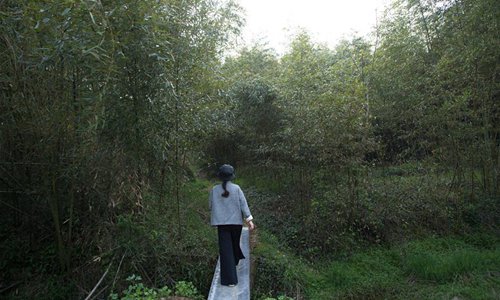
Wang Xiao walks to her tea garden at Guanyinqiao Village of Anji County, east China's Zhejiang Province, April 5, 2019. After graduating from college in 2011, Wang Xiao went back to her hometown in Anji County to manage her family's tea garden. Not only has she stopped applying chemical fertilizers to her tea garden, but also she tries to use a new way to dry tea leaves with charcoal fire, as an effort to improve the tea quality. Currently, her tea garden, about 10 mu or (about 0.67 hectare), is able to produce more than 50 kg of white tea a year. (Photo: Xinhua)

Wang Xiao (1st R) makes tea for customers at a teahouse in Baishuiwan Village of Anji County, east China's Zhejiang Province, April 6, 2019. After graduating from college in 2011, Wang Xiao went back to her hometown in Anji County to manage her family's tea garden. Not only has she stopped applying chemical fertilizers to her tea garden, but also she tries to use a new way to dry tea leaves with charcoal fire, as an effort to improve the tea quality. Currently, her tea garden, about 10 mu or (about 0.67 hectare), is able to produce more than 50 kg of white tea a year. (Photo: Xinhua)
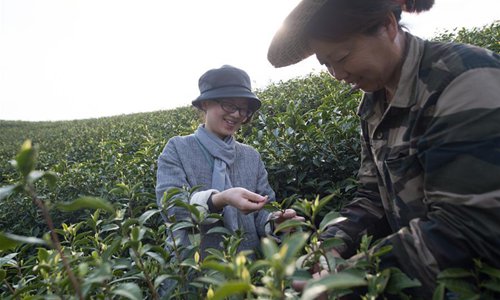
Wang Xiao (L) and her mother pick tea leaves at their tea garden in Guanyinqiao Village of Anji County, east China's Zhejiang Province, April 5, 2019. After graduating from college in 2011, Wang Xiao went back to her hometown in Anji County to manage her family's tea garden. Not only has she stopped applying chemical fertilizers to her tea garden, but also she tries to use a new way to dry tea leaves with charcoal fire, as an effort to improve the tea quality. Currently, her tea garden, about 10 mu or (about 0.67 hectare), is able to produce more than 50 kg of white tea a year. (Photo: Xinhua)
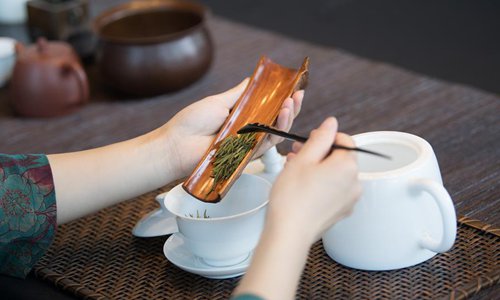
Wang Xiao makes tea for customers at a teahouse in Baishuiwan Village of Anji County, east China's Zhejiang Province, April 6, 2019. After graduating from college in 2011, Wang Xiao went back to her hometown in Anji County to manage her family's tea garden. Not only has she stopped applying chemical fertilizers to her tea garden, but also she tries to use a new way to dry tea leaves with charcoal fire, as an effort to improve the tea quality. Currently, her tea garden, about 10 mu or (about 0.67 hectare), is able to produce more than 50 kg of white tea a year. (Photo: Xinhua)
